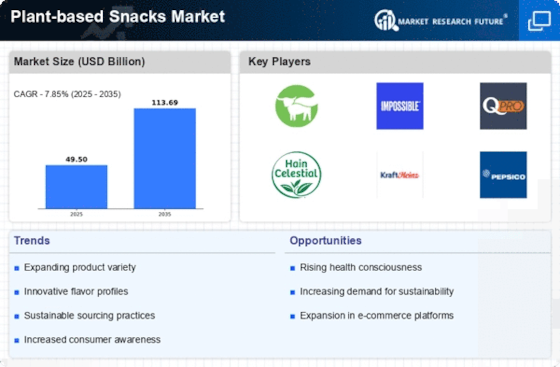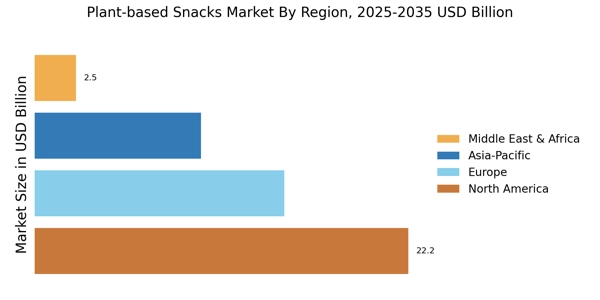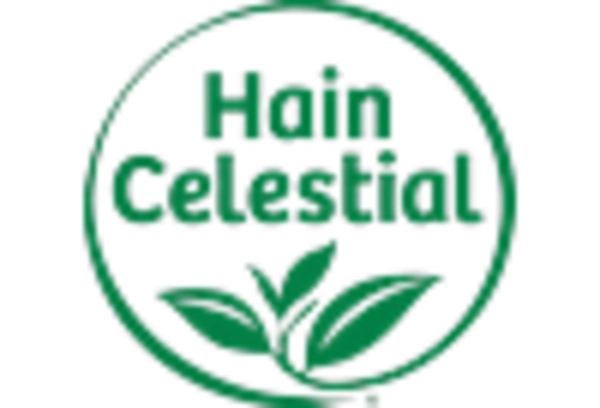Flavor Innovation and Variety
Flavor innovation and variety are crucial drivers in the Plant-based Snacks Market. As consumer preferences evolve, there is a growing demand for diverse and exciting flavors in plant-based snacks. Manufacturers are responding by introducing unique flavor profiles that appeal to a broader audience, including spicy, sweet, and savory options. This trend is supported by market data showing that innovative flavors can significantly enhance consumer interest and drive sales. Additionally, the introduction of limited-edition flavors and collaborations with popular brands can create buzz and attract new customers. The ability to offer a wide range of flavors not only caters to diverse palates but also positions brands as leaders in the competitive plant-based snack landscape.
Convenience and On-the-go Snacking
The increasing demand for convenience and on-the-go snacking is reshaping the Plant-based Snacks Market. As lifestyles become busier, consumers are seeking snacks that are easy to consume and fit seamlessly into their daily routines. Plant-based snacks, often available in portable packaging, cater to this need for convenience. Market data suggests that the sales of single-serve and ready-to-eat plant-based snacks are on the rise, indicating a shift in consumer behavior towards quick and accessible options. This trend highlights the importance of convenience in driving market growth, as consumers are likely to choose snacks that align with their fast-paced lifestyles. Brands that successfully market their products as convenient and healthy options may find themselves at a competitive advantage.
Health Benefits of Plant-based Snacks
The increasing awareness of health benefits associated with plant-based diets appears to be a primary driver for the Plant-based Snacks Market. Consumers are increasingly seeking snacks that are lower in saturated fats and cholesterol, which are often found in traditional snack options. Research indicates that plant-based snacks can contribute to improved heart health, weight management, and overall well-being. As a result, the demand for snacks that are rich in nutrients, fiber, and antioxidants is on the rise. This trend is reflected in market data, which shows that the plant-based snack segment is projected to grow at a compound annual growth rate of over 10% in the coming years. This growth suggests that health-conscious consumers are likely to continue prioritizing plant-based options in their snacking choices.
Rise of Veganism and Plant-based Diets
The rise of veganism and plant-based diets is a significant driver of the Plant-based Snacks Market. As more individuals adopt plant-based lifestyles for health, ethical, or environmental reasons, the demand for plant-based snacks continues to grow. This shift is reflected in market data, which indicates that the number of consumers identifying as vegan has increased substantially in recent years. The growing acceptance of plant-based diets is encouraging manufacturers to expand their product lines to include a wider variety of plant-based snacks. This trend suggests that the market will likely see continued innovation and growth as brands strive to meet the evolving preferences of consumers who are increasingly embracing plant-based eating.
Sustainability and Ethical Consumption
The growing emphasis on sustainability and ethical consumption is significantly influencing the Plant-based Snacks Market. Consumers are increasingly concerned about the environmental impact of their food choices, leading to a shift towards plant-based snacks that are perceived as more sustainable. The production of plant-based snacks typically requires fewer natural resources compared to animal-based products, which aligns with the values of environmentally conscious consumers. Market data indicates that brands focusing on sustainable sourcing and eco-friendly packaging are experiencing higher sales growth. This trend suggests that companies that prioritize sustainability in their product offerings may capture a larger share of the market, as consumers are likely to support brands that align with their ethical beliefs.

















